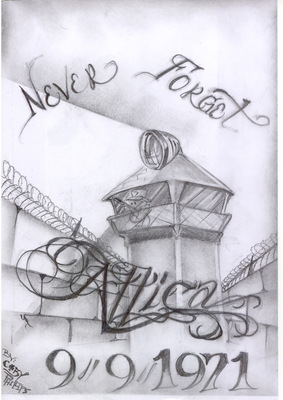I don’t read much in ULK about Florida prisons. This is
unfortunate because readers may believe the Florida Department of
Corruption (FDOC) is like the California, Texas or Arizona systems. This
is not true. There are conditional differences as well as attitudinal
differences between the north and south Florida prisons.
Some notable conditional differences are in what has been referred to in
ULK as SHUs and the unity among Florida prisons. The FDOC has
Control Management Units (CM). One can find these on CMI, CMII, or CMIII
for 3, 2, or 1 year, respectively. In the beginning, the early 1990s,
these were sensory deprivation cells. During the CM heyday of the late
1990s you didn’t even have to commit a disciplinary infraction, just be
considered a ‘management problem.’ Torture was the name of the game.
Suicide was frequent. With help from the outside, lawsuits were filed
and settled, and the CM system changed at the close of the 90s. This did
not bring a close to the shattered lives of the survivors of these
imperialist torture cells. FDOC still has CM, but it is not as easy to
put someone on CM status, and they are not sensory deprivation any
longer. Brutality and rampant use of tear gas sill happen, but not as
bad or often as before. I urge comrades in the other states to keep up
the struggle and to not think any sacrifice you may make is too much. A
couple of my friends lost their lives trying to get out of those torture
cells and two more took their own lives after release from prison due to
continuing mental instability after years in CM. It doesn’t go away when
the door opens!
It appears to me, after reading several issues of ULK, that
there is more unity in other states. There is no organization among
different prisons nor even among individuals within a single prison here
in Florida. They are more like cliques operating for extortion purposes.
Unity is virtually nonexistent against the administration.
Unity is not even a concern of the guards. In my present experience, I
am a peer facilitator in a certain program. The institution requires
everyone in the program to live in the same dormitory and to meet at
least once a day, 25 at a time in a separate classroom, to complete
character based programs, i.e. imperialist brainwashing, that I then
conduct unsupervised - Ha! Comrades, you would think this is the perfect
opportunity to organize and unify, but it doesn’t work that way. There
is much inner struggle. When I speak of how the imperialists define a
box and then they say it is our own fault that we don’t fit in it; that
we are here, I am met with scorn. I have started a slogan: Power to the
poor people, but it is slow to catch on - no one is poor? When I filed a
grievance on an officer for not doing her job it was labeled as
‘snitching on the police’ as if that’s even possible! When the water
cooler broke and we needed it fixed, I asked who all will file a
grievance. No one would: no one did. There is a fear about unifying to
file grievances.
Furthermore, as I stand up and speak on oppression and revolutionary
ideas; about socialism and communism, I alienate myself more and more
from my fellow white nation. It is just like a comrade from MIM wrote me
recently - I am committing class suicide (a small sacrifice indeed). I
am labeled communist as if that were a dirty word! If any comrades know
of a technique I can use to get these guys united, let me know.
North Florida prisons vary from south Florida prisons in the general
attitudes of the guards and administrators. The north Florida prisons
are mostly operated by the white nation. These prisons are more
structured, restrictive, and command more discipline. The south Florida
prisons are mostly operated by the Black and Latino nations and are not
as well organized, loosely run, and more laid back. It is not so easy to
get a disciplinary report or go to disciplinary confinement while in a
south Florida prison.
I said that to say this; keep the struggle against the man, not
yourselves. Remember who the enemy is no matter what type of prison you
are in, be it a north or south Florida type. Just because some of you
have better conditions than others doesn’t mean be pacified, it means
you can struggle more; struggle harder.
MIM(Prisons) responds: This comrade raises a good point about
analyzing the conditions where we are at. Each state, and even each
prison, has different conditions with different contradictions and
struggles. While this comrade is frustrated by the current lack of unity
in Florida prisons, s/he gives a good example of unified struggle from
the 90s and so we can see that conditions we face change over time. We
do have the power to affect these conditions. It won’t happen overnight,
but through education we will build unity. Where there was unity around
a shared struggle against Control Management Units, we might look to
build unity today around another common struggle. This is a challenge
for USW comrades in Florida: to determine what issue will be best to
focus on at this time. Regardless of the issue, spreading Under Lock
& Key and other revolutionary material, and talking to others
about their situation and the system, will help build consciousness.
When we are met with scorn when we talk about the imperialists, we may
need to take another approach, start from something that is bothering
someone. Try to tie this back to the imperialist system so they can see
the connections. And remember that even if we don’t gain a comrade
today, we may have planted the seeds for revolutionary consciousness.









